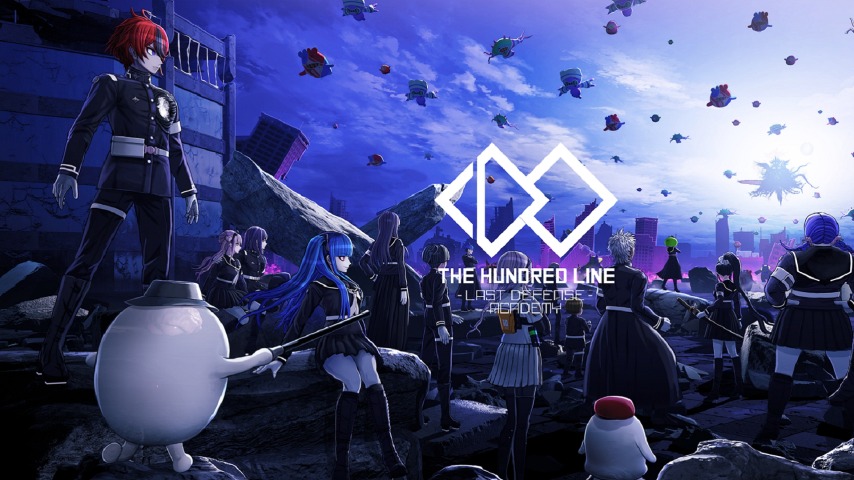Shamelessness is an underrated quality in art. Restraint is great, too, of course, but everybody likes restraint. Restraint is classy, dignified. It orders, in hushed tones and perfect French, off the menu in classy restaurants. Shamelessness screams numbers at the drive-thru speaker until it has enough artery-clogging madness to smoosh together into something huge, ugly, and deeply satisfying, and then goes back for seconds.
I write this with the caveat that I have not finished the new game, a collaboration from Danganronpa creator Kazutaka Kodaka and Zero Escape/AI: The Somnium Files writer Kotaro Uchikoshi. Not for lack of trying, because Hundred Line is a deceptively massive game, as Kodaka and Uchikoshi have apparently tried to shove all their various obsessions into a single package. Do you want teenage angst? Killing games? Murder mysteries? Meditations on hope and despair? Mildly embarrassing anime fanservice? Sudden info-dumps of what are clearly recent Wikipedia dives? Characters who are both caricatures of human behavior and surprisingly easy to like? The game’s authors—and the rest of its team at Too Kyo Games—have shoved it all in there, along with a pretty fun turn-based tactical game, to boot. I’ve been up too late, more nights than not, over the last two weeks, consuming this stuff by the pile, and I’d still estimate that I only recently crossed the halfway line on all its content. Kodaka and Uchikoshi were already writers who had never met an editor they couldn’t ignore, and having them combine forces has created a truly horrifying monster that I’m unfortunately deeply inclined to love.
The premise will be very familiar to Danganronpa fans: Regular Teen Takumi wakes up in a bizarre school, where he and several others are told that they are humanity’s last hope, forced to defend the Academy against waves of inhuman “Invaders.” Hold out successfully for 100 days, and…
Well, that’s hard to talk about, because huge amounts of The Hundred Line are hard to talk about. Both Kodaka and Uchikoshi have long track records of writing addictively compelling (if sometimes also very cheesy) mysteries, and the world of the Last Defense Academy is full of them. Many of them, annoyingly, also reflect on the most interesting things the game is doing with its structure, playing with the nature of choice in the visual novel medium the game operates in for about 80 percent of its time. Can Takumi actually affect the outcome of any of the crises he’s embroiled in? I literally don’t know, after about 50 hours of play: The game has veered back and forth on the point multiple times, often in deliberately troll-y ways. It’s a game that knows you’ve probably played most of the games its creators became famous for, and is extremely happy to screw with your perceptions of their very specific conventions.
If you’re repulsed by the things that are repulsive about games like this—the repetitive dialogue, the unrepentant horniness, the entire “Saying in a page of dialogue what could have been said in a sentence” of it all—then The Hundred Line might very well repel you the most. (The addition of combat, while fun, is too simplistic to save the game from its narrative critics; to fall back on basic comparisons, it has a lot more in common with tower defense games than Final Fantasy Tactics. It reminds me quite a bit of 2019’s 13 Sentinels: Aegis Rim, actually, although this game is much more ambitious with its story material.)
As for me, well: Like I said, I can get restraint all over the place. Everybody likes restraint. But I can’t help but be delighted by the sheer excess of what I’m seeing in Hundred Line, as it somehow aspires to not just be a game written by Kazutaka Kodaka and Kotaro Uchikoshi, but, like, all games they could ever potentially write together. (Possibly literally: Kodaka has talked on social media about the studio being on the verge of going under.) There are a million practical reasons not to make a game like this, to rein in scope, to apply the blessed virtue of focus to both your design document and your script. But I can’t help but adore my time with it, even when it’s frustrating, or too silly, or deliberately creates points of tension that it then refuses to pay off. It’s storytelling at maximum volume, minimum shame, and I’ll take as much of it as I can get.

 Keep scrolling for more great stories.
Keep scrolling for more great stories.
